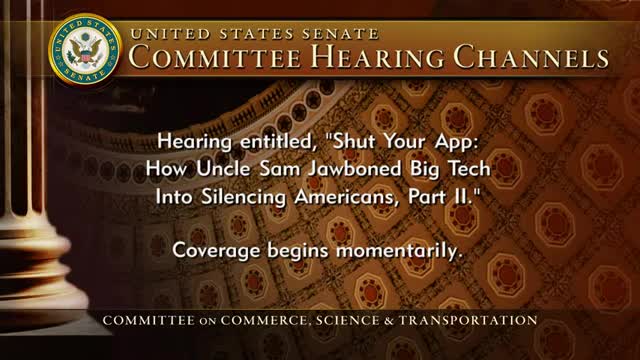Senate Commerce Committee weighs whether federal officials coerced tech companies to silence users
Get AI-powered insights, summaries, and transcripts
Subscribe
Summary
The Senate Committee on Commerce, Science, and Transportation held a hearing examining whether federal agencies pressured major technology platforms to remove or suppress lawful speech.
The Senate Committee on Commerce, Science, and Transportation held a hearing examining whether federal agencies pressured major technology platforms to remove or suppress lawful speech.
Chairman Ted Cruz opened the hearing by invoking free-speech principles and previewing legislation he said he would introduce, the Jawbone Act, to create a private right of action for Americans who can show government-driven censorship. "That's why I will soon introduce new legislation, the Jawbone Act, which will provide a robust right to redress when Americans are targeted by their own government," Cruz said at the outset.
Googleand Meta told the committee they make moderation decisions under their own policies. Mark Erickson, vice president for government affairs and public policy at Google, said the company publishes transparency reports and "develop[s] and enforce[s] our policies independently." Neil Potts, vice president for public policy at Meta, told senators the company "did feel pressure from the Biden administration to censor content related to COVID-19" but added that the firm ultimately made its own choices and has since adopted policy changes, including moving away from third-party fact-checking.
Free-speech advocates urged stronger disclosure and deterrence. Will Creeley, legal director for the Foundation for Individual Rights and Expression, said indirect pressure frequently leaves targeted users without a clear causal record and that courts have struggled to provide remedies: "This indirect censorship violates the First Amendment just as surely as direct suppression," he testified, and urged statutes requiring disclosure of federal communications with platforms. Harold Feld of Public Knowledge said courts distinguish permissible persuasion from unlawful coercion by looking at (1) whether the contact is governmental, (2) whether the agency has the power to punish, and (3) whether there is evidence of intent to use that power.
Several senators pressed witnesses about moderation during the COVID-19 pandemic and after the 2020 election. Chairman Cruz asked why YouTube at one point removed videos repeating claims of widespread election fraud after states certified results; Erickson said Googletrust-and-safety teams acted at the time because they assessed a risk of "real-world harm" and later relaxed that posture when the risk subsided. Potts said Meta regrets not having been more vocal in resisting pressure then.
Senators also raised reported settlements between platforms and a former president. Members cited news reports that Google and Meta reached settlements with former President Donald Trump; when asked about specific amounts, witnesses said the companies had settled lawsuits and that they were familiar with reporting but did not provide detailed financial breakdowns during the hearing.
Witnesses and advocates urged Congress to consider both transparency and deterrence to address jawboning. In response, all four witnesses expressed willingness to review proposed statutory text; Erickson, Potts, Creeley, and Feld each said they would evaluate and work with lawmakers on legislative language.
The hearing record was left open for questions until Nov. 5; witnesses were given until Nov. 19 to respond.
The exchange highlighted a continuing split: platforms emphasize independent content policies and the operational difficulty of policing billions of items, while advocates and several senators argued the governmentplatform relationship requires statutory safeguards to prevent indirect suppression of speech.
